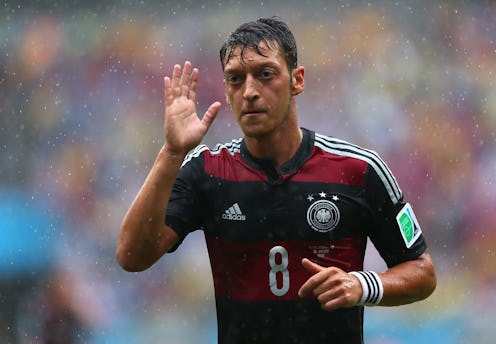Ramadan, the Muslim month of fasting, began Saturday evening, which means that over a billion people around the world will spend their daylight hours over the course of the next month abstaining from food and water. This year, Ramadan coincides with The World Cup, and a number of teams have players who will be observing. Even before the start of Ramadan, FIFA had to implemented "cooling breaks," anytime temperatures climb above 89.6F – which, as we understand it, happens pretty frequently in Brazil. This is the first time that cooling breaks have ever been instituted.
To avoid additional exertion in the hot sun, some teams may practice at night, although games will still be played in the heat of the day. In addition, since it becomes more difficult to perform tasks during the day, sleep schedules tend to shift dramatically for people during Ramadan. This means that players could become exhausted during their matches, from staying up late into the night eating, drinking, and practicing.
Algeria and Nigeria are two teams likely to be affected, as they have both qualified for the knockout stage of the World Cup, which will be played during Ramadan. But Ramadan won't just affect teams from Muslim countries. According to the Huffington Post, France, Germany, Switzerland, and Belgium are likely to be affected as well. All four teams have multiple Muslim players who may observe the fast.
On Monday, FIFA's chief medical officer, Jiri Dvorak, said he was confident that players would be able to grapple with the physical hardships of playing while fasting. "We have made extensive studies of players during Ramadan, and the conclusion was that if Ramadan is followed appropriately, there will be no reduction in the physical performances of players," Dvorak told reporters.
He also mentioned that he'd discussed the issue with some of Algeria's religious leaders, and had been informed that players can request an exemption from fasting, in order to play. Such players would observe "Ramadan at a more appropriate time," Dvorak said. Mesut Ozil, a Turkish player on Germany's team, has already announced he won't partake in the fast.
The Algerian team, which only has Muslim players, has been a source of much speculation regarding Ramadan. Vahid Halilhodzic, the Algerian coach has responded to questions from the press with anger, arguing that fasting is a personal choice that such questions are invasive. "This is a private matter and when you ask this you lack respect and ethics," Halilhodzic told reporters during a pre-match conference. "The players will do as they wish and I would like to stop this controversy."
